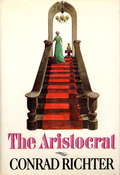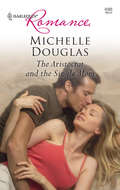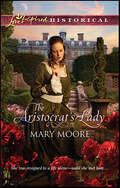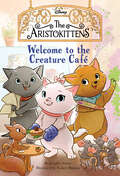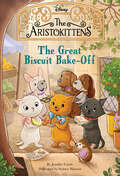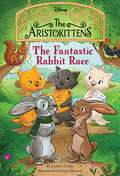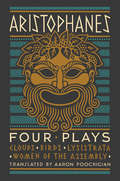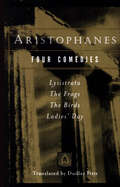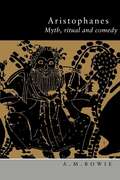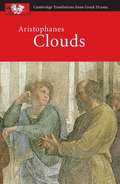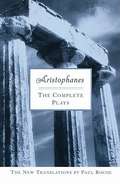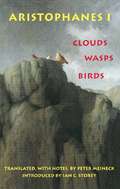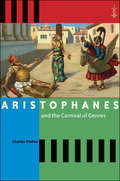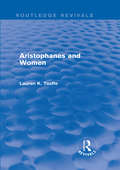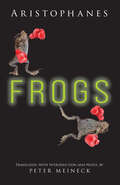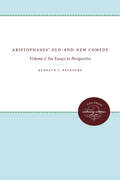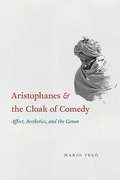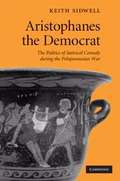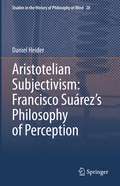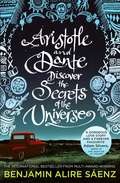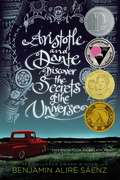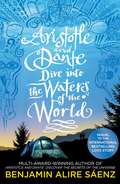- Table View
- List View
The Aristocrat
by Conrad RichterAn infinitely attractive human being--a great lady, American-style--comes alive in Conrad Richter's wonderful new novel. She is Miss Alexandria Morley, and in her eighties--a doughty warrior against creeping modernity and mediocrity. She has the warmest of hearts. She is the coolest of strategists. It is a joy to see her do battle. Secure in her Victorian mansion, in "her" Pennsylvania town, flying her flag in defense of principle and old-time decorum, she takes on and outclasses the mighty coal company (she's caught them cheating on taxes); civilizes her roughhewn young doctor (good character is no license for crudity); copes patiently (family obligations are sacred) with the poor old cousin who is a tidal wave of garrulous idiocy; stands firm against the poisonous cousin who is a knot of destructive envy; puts herself gently at the service of a sweet young cousin who cannot decide among her eligible beaux. All around her, in her house, in her memories, the past swirls. But Miss Alexandria lives in the now. She hopes, out of courtesy to her heirs, to die when her stocks are up. She tells the truth to those who can bear it--most especially to herself. She has learned, from the Southern belle who was her mother, to love the graces of life--and, from the mining potentate who was her father, to give no quarter to foolish circumstances. Even on her deathbed, Miss Alexandria, who has warned the officious clergyman that she won't have anyone praying aloud over her, wins a gallant victory. Like her dear ones and her adversaries, her servants and her fellow townspeople, the reader will take his hat off to the Aristocrat. She is the last of her kind.
The Aristocrat and the Single Mom
by Michelle DouglasHandsome English aristocrat Lord Simon Morton-Blake is reluctant to get involved with anyone on his visit to Australia-especially a single mother like Kate Petherbridge! But Simon can't deny his attraction to vivacious Kate, or refuse her offer of a place to stay. Thrown into the middle of Kate's lively family, Simon finds his buttoned-up manner slowly undone. A happy family isn't something Simon's known before, but he's starting to realize there's one ready-made, just for him....
The Aristocrat's Lady
by Mary MooreAn Unexpected EncounterFor a few moments on a moonlit balcony, Nicole Beaumont was just a beautiful woman catching the eye of the handsome Lord Devlin-but she knew the illusion couldn't last. If the enigmatic aristocrat knew her secret, he'd realize that her disability left her unfit for love. So who could blame her for hiding the truth a little longer?Devlin had never met a woman like Nicole. Her unique combination of innocence and wisdom left him utterly intrigued. Yet what was she hiding? For a man who did not trust easily, discovering her secret was devastating. Overcoming their pasts and forging a future would take faith, forgiveness and trust. And second chances could lead to new beginnings...
The Aristokittens #1: Welcome to the Creature Café (The Aristokittens)
by Jennifer CastleFor fans of Unicorn Princesses and Purrmaids, this illustrated chapter book series follows kittens Marie, Berlioz, and Toulouse from Disney's The Aristocats as they embark on their next adventure--opening a Parisian critter c afé! Meet the Aristokittens, a trio of siblings with big (and delicious) plans! One day, while chasing each other through the streets of Paris, Marie, Berlioz, and Toulouse uncover an abandoned café made just for animals. After hearing stories of the café's wondrous past, the kittens decide to reopen the place themselves. But the trio can't agree on the menu, music, and decorations. With opening day creeping closer, can the kittens avoid a total catastrophe and create the purrfect recipe for success? Filled with mystery, humor, and friendship, each book in the Aristokittens series expands the world of Disney's The Aristocats through the eyes of its iconic kitten trio . . . and is the perfect recipe for fun! Don't miss the Aristokittens' next adventure: * The Great Biscuit Bake-Off
The Aristokittens #2: The Great Biscuit BakeOff (The Aristokittens)
by Jennifer CastleFor fans of Unicorn Princesses and Purrmaids, this illustrated chapter book series follows kittens Marie, Berlioz, and Toulouse from Disney's The Aristocats as they embark on their next adventure--opening a Parisian critter c afé! Meet the Aristokittens, a trio of siblings with big (and delicious) plans! After meeting three new puppy friends, kittens Marie, Berlioz, and Toulouse have a wonderful idea: they'll host a Dog Biscuit Bake-Off at their café! Toulouse can't wait to enter and prove that he's more than just the café's artist. But the competition gets hairy, fast, when he and Marie join rival teams--and Berlioz is caught in the middle. Will the Bake-Off be a grand success, or a doggone disaster? Filled with mystery, humor, and friendship, each book in the Aristokittens series expands the world of Disney's The Aristocats through the eyes of its iconic kitten trio . . . and is the perfect recipe for fun! Don't miss the Aristokittens' first adventure: * Welcome to the Creature Café
The Aristokittens #3: The Fantastic Rabbit Race
by Jennifer CastleDisney magic meets adorable kittens in this illustrated chapter book series that stars Marie, Berlioz, and Toulouse from The Aristocats on a new adventure--running their own creature cafe! When the annual Fantastic Rabbit Race kicks off in Paris's Luxembourg Gardens, Marie, Berlioz, and Toulouse's secret cafe for animals becomes busier than ever! Berlioz notices that talented but awkward new racer Angelique isn't quite fitting in with her fellow contestants, so he decides to cheer her on--but he's disappointed when Marie and Toulouse keep their distance, worried about "playing favorites." Things get even stranger when another racer, Skip Hopper, shows up and starts acting very oddly. . . Can the kittens work together to make sure the race is fair--and that the cafe feels like a welcoming place for all? Filled with mystery, fun, and friendship, each book in the Aristokittens series expands the world of Disney's The Aristocats through the eyes of its iconic kitten trio--and is the perfect recipe for fun! Read the whole Aristokittens series! * Welcome to the Creature Cafe * The Great Biscuit Bake-Off
Aristophanes: Clouds, Birds, Lysistrata, Women Of The Assembly
by AristophanesCapturing the antic outrageousness and lyrical brilliance of antiquity’s greatest comedies, Aaron Poochigian’s Aristophanes: Four Plays brings these classic dramas to vivid life for a twenty-first century audience. The citizens of ancient Athens enjoyed a freedom of speech as broad as our own. This freedom, parrhesia, the right to say what one pleased, how and when one pleased, and to whom, had no more fervent champion than the brilliant fifth-century comic playwright Aristophanes. His plays, immensely popular with the Athenian public, were frequently crude, even obscene. He ridiculed the great and the good of the city, showing up their hypocrisy and arrogance in ways that went far beyond the standards of good taste, securing the ire (and sometimes the retaliation) of his powerful targets. He showed his contemporaries, and he teaches us now, that when those in power act obscenely, patriotic obscenity is a fitting response. Aristophanes’s satirical masterpieces were also surpassingly virtuosic works of poetry. The metrical variety of his plays has always thrilled readers who can access the original Greek, but until now, English translations have failed to capture their lyrical genius. Aaron Poochigian, the first poet-classicist to tackle these plays in a generation, brings back to life four of Aristophanes’s most entertaining, wickedly crude, and frequently beautiful lyric comedies—the pinnacle of his comic art: · Clouds, a play famous for its caricature of antiquity’s greatest philosopher, Socrates; · Lysistrata, in which a woman convinces her female compatriots to withhold sex from their warmongering lovers unless they negotiate peace; · Birds, in which feathered creatures build a great city and become like gods; · and Women of the Assembly, Aristophones’s most revolutionary play, which inverts the norms of gender and power. Poochigian’s new rendering of these comic masterpieces finally gives contemporary readers a sense of the subversive pleasure Aristophones’s original audiences felt when they were first performed on the Athenian stage.
Aristophanes: Four Comedies
by AristophanesNew English versions of Lysistrata, The Frogs, The Birds, and Ladies' Day. "Thanks to Dudley Fitts...we can appreciate Aristophanes' vigor, his robust style, his scorching wit, his earthy humor, his devotion to honesty and his poetic imagination" (Brooks Atkinson, New York Times). Index.
Aristophanes: Myth, Ritual and Comedy
by A. M. BowieThis book examines the plays of the Greek comic writer Aristophanes and attempts to reconstruct the responses of the original audiences by using anthropological techniques to compare the plays with those Greek myths and rituals that share similar story patterns or subject matter. It is the first book to apply this type of analysis systematically to all the comedies, and also differs from earlier studies in that it does not impose a single interpretative structure on the plays. All Greek is translated.
Aristophanes: Clouds
by John Claughton Judith Affleck AristophanesTreating ancient plays as living drama. Classical Greek drama is brought vividly to life in this series of new translations. <P><P>Students are encouraged to engage with the text through detailed commentaries, including suggestions for discussion and analysis. In addition, numerous practical questions stimulate ideas on staging and encourage students to explore the play's dramatic qualities. <P>Clouds is suitable for students of both Classical Civilisation and Drama. Useful features include full synopsis of the play, commentary alongside translation for easy reference and a comprehensive introduction to the Greek Theatre. <P>Clouds is aimed primarily at A-level and undergraduate students in the UK, and college students in North America.<P> Designed for both study and performance, the translations remain faithful to the original Greek, yet have the immediacy of contemporary English.<P> Detailed commentary alongside the translation makes it easy for students to reference and follow, without interrupting their reading of the play.<P> A full synopsis of the play and background information to the story supports students studying a range of plays.<P> A comprehensive introduction to Greek theatre and a guide to the pronunciation of names supports readers and students with no previous knowledge of Greek drama.<P> Activities and suggestions for discussion and analysis allow easy access to the play and enhance reading.<P> Useful notes and questions encourage discussion on the themes and dramatic qualities of the text, and the more practical issues of staging and performance.
Aristophanes: The Complete Plays
by Paul RocheA brand-new translation of the world's greatest satirist.With a signature style that is at once bawdy and delicate, as well as a fearless penchant for lampooning the rich and powerful, Aristophanes remains arguably the finest satirist of all time. Collected here are all 11 of his surviving plays-newly translated by the distinguished poet and translator Paul Roche.
Aristophanes 1: Clouds, Wasps, Birds
by Aristophanes Peter Meineck Ian C. StoreyOriginally adapted for the stage, Peter Meineck's revised translations achieve a level of fidelity appropriate for classroom use while managing to preserve the wit and energy that led The New Yorker to judge his CloudsThe best Greek drama we've ever seen anywhere," and The Times Literary Supplement to describe his Wasps as "Hugely enjoyable and very, very funny. A general Introduction, introductions to the plays, and detailed notes on staging, history, religious practice and myth combine to make this a remarkably useful teaching text.
Aristophanes, 2: Wasps, Lysistrata, Frogs, The Sexual Congress (Penn Greek Drama Ser.)
by David R. Slavitt Palmer Bovie Campbell McGrath X. J. Kennedy Alfred Corn R. H. W. DillardThe Penn Greek Drama Series presents original literary translations of the entire corpus of classical Greek drama: tragedies, comedies, and satyr plays. It is the only contemporary series of all the surviving work of Aeschylus, Sophocles, Euripides, Aristophanes, and Menander.
Aristophanes and the Carnival of Genres (Arethusa Books)
by Charles PlatterThe comedies of Aristophanes are known not only for their boldly imaginative plots but for the ways in which they incorporate and orchestrate a wide variety of literary genres and speech styles. Unlike the writers of tragedy, who prefer a uniformly elevated tone, Aristophanes articulates his dramatic dialogue with striking literary and linguistic juxtapositions, producing a carnivalesque medley of genres that continually forces both audience and reader to readjust their perspectives. In this energetic and original study, Charles Platter interprets the complexities of Aristophanes' work through the lens of Mikhail Bakhtin's critical writing.This book charts a new course for Aristophanic comedy, taking its lead from the work of Bakhtin. Bakhtin describes the way multiple voices—vocabularies, tones, and styles of language originating in different social classes and contexts—appear and interact within literary texts. He argues that the dynamic quality of literature arises from the dialogic relations that exist among these voices. Although Bakhtin applied his theory primarily to the epic and the novel, Platter finds in his work profound implications for Aristophanic comedy, where stylistic heterogeneity is the genre's lifeblood.
Aristophanes and the Poetics of Competition
by Zachary P. BilesAthenian comic drama was written for performance at festivals honouring the god Dionysos. Through dramatic action and open discourse, poets sought to engage their rivals and impress the audience, all in an effort to obtain victory in the competitions. This book uses that competitive performance context as an interpretive framework within which to understand the thematic interests shaping the plots and poetic quality of Aristophanes' plays in particular, and of Old Comedy in general. Studying five individual plays from the Aristophanic corpus as well as fragments of other comic poets, it reveals the competitive poetics distinctive to each. It also traces thematic connections with other poetic traditions, especially epic, lyric, and tragedy, and thereby seeks to place competitive poetics within broader trends in Greek literature.
Aristophanes and Women (Routledge Revivals)
by Lauren TaaffeAristophanes and Women, first published in 1993, investigates the workings of the great Athenian comedian’s ‘women plays’ in an attempt to discern why they were in fact probably quite funny to their original audiences. It is argued that modern students, scholars, and dramatists need to consider much more closely the conditions of the plays’ ancient productions when evaluating their ostensible themes. Three plays are focused upon: Lysistrata, Thesmophoriazusae, and Ecclesiazusae. All seem to speak quite eloquently to contemporary concerns about women’s rights, the value of women’s work, and the relationships between women and war, literary representation and politics. On the one hand, Professor Taaffe tries to retrieve what an ancient Athenian audience may have l appreciated about these plays and what their central theses may have meant within that culture. On the other hand, Aristophanes is discussed from the perspective of a late twentieth-century, specifically female, reader.
Aristophanes: Frogs
by AristophanesAristophanes's classic send-up of rivalry within the ultra-competitive world of fifth-century Athenian theatre wins a new lease on life in this fresh line-for-line translation by Peter Meineck. Premiered in 2021 by Aquila Theatre and accompanied here by Meineck&’s notes and wide-ranging Introduction, this Frogs offers the best view yet of a high-stakes afterlife contest between two of Athens's late great playwrights. Both are undisputed masters of tragedy. But only one can win and return to save the city.
Aristophanes' Old-and-New Comedy: Volume I: Six Essays in Perspective
by Kenneth J. ReckfordThis startling and original study emerged from Kenneth Rockford's wish to vindicate Aristophanes' Clouds against detractors. As a result of years of rereading and teaching Aristophanes, he realized that the Clouds could not be defended in an analysis of that play in isolation. A better approach, he decided, would be to define a comic perspective within which Aristophanes' comedies in general as well as the Clouds in particular could be appreciated.This first volume of Reckford's defense examines the comedies as a whole in a series of defining essays, each with its own dominant concern and method of approach. The author begins by exploring not the usual questions of Aristophanes' political attitudes and his place in the development of comedy, but rather the festive, celebratory, and Dionysian nature of Old Comedy. Here and throughout the book Reckford illustrates Aristophanes' form of comedy with analogies to Rabelais, Shakespeare, Charlie Chaplin, Alice in Wonderland, and The Wonderful Wizard of Oz.In the remaining essays Reckford goes beyond the usual Freudian approaches, reinterpreting the comic catharsis as a clarification of wishing and hoping. He also explores the growth of plays from comic idea to comic performance, in ways reflected in Tom Stoppard's plays today. Only then are Aristophanes' basic political loyalties described, as well as the place of his old- and-new comedy within the history of the genre.In a book that is as much about comedy generally as it is about Aristophanes specifically, some plays are treated more fully than others. Reckford discusses the Wasps at length, comparing the symbolic transformations and comic recognitions in the play with dream experience and dream interpretation. He also analyzes the Peace, the Acharians, the Birds, and the Frogs. Reckford's vindication of the Clouds will appear in the second volume of his defense, Clouds of Glory.Reckford's playful translations preserve the puns and anachronisms of Aristophanes, maintaining the playwright's comic feeling and tone. Combining traditional classical scholarship with a variety of literary, psychological, and anthropological approaches, he has written a study that will appeal to both the academic audience and the general reader who cares about comedy.Originally published in 1987.A UNC Press Enduring Edition -- UNC Press Enduring Editions use the latest in digital technology to make available again books from our distinguished backlist that were previously out of print. These editions are published unaltered from the original, and are presented in affordable paperback formats, bringing readers both historical and cultural value.
Aristophanes & the Cloak of Comedy: Affect, Aesthetics, and the Canon
by Mario TelòThe Greek playwright Aristophanes (active 427–386 BCE) is often portrayed as the poet who brought stability, discipline, and sophistication to the rowdy theatrical genre of Old Comedy. In this groundbreaking book, situated within the affective turn in the humanities, Mario Telò explores a vital yet understudied question: how did this view of Aristophanes arise, and why did his popularity eventually eclipse that of his rivals? Telò boldly traces Aristophanes’s rise, ironically, to the defeat of his play Clouds at the Great Dionysia of 423 BCE. Close readings of his revised Clouds and other works, such as Wasps, uncover references to the earlier Clouds, presented by Aristophanes as his failed attempt to heal the audience, who are reflected in the plays as a kind of dysfunctional father. In this proto-canonical narrative of failure, grounded in the distinctive feelings of different comic modes, Aristophanic comedy becomes cast as a prestigious object, a soft, protective cloak meant to shield viewers from the debilitating effects of competitors’ comedies and restore a sense of paternal responsibility and authority. Associations between afflicted fathers and healing sons, between audience and poet, are shown to be at the center of the discourse that has shaped Aristophanes’s canonical dominance ever since.
Aristophanes the Democrat: The Politics of Satirical Comedy During the Peloponnesian War
by Keith SidwellThis book provides a new interpretation of the nature of Old Comedy and its place at the heart of Athenian democratic politics. Professor Sidwell argues that Aristophanes and his rivals belonged to opposing political groups, each with their own political agenda. Through disguised caricature and parody of their rivals' work, the poets expressed and fuelled the political conflict between their factions. Professor Sidwell rereads the principal texts of Aristophanes and the fragmented remains of the work of his rivals in the light of these arguments for the political foundations of the genre.
Aristophanes' Thesmophoriazusae
by Ashley ClementsAristophanes' comic masterpiece Thesmophoriazusae has long been recognized amongst the plays of Old Comedy for its deconstruction of tragic theatricality. This book reveals that this deconstruction is grounded not simply in Aristophanes' wider engagement with tragic realism. Rather, it demonstrates that from its outset Aristophanes' play draws upon Parmenides' philosophical revelations concerning reality and illusion, employing Eleatic strictures and imagery to philosophize the theatrical situation, criticize Aristophanes' poetic rival Euripides as promulgator of harmful deceptions, expose the dangerous complicity of Athenian theatre audiences in tragic illusion, and articulate political advice to an audience negotiating a period of political turmoil characterized by deception and uncertainty (the months before the oligarchic coup of 411 BC). The book thereby restores Thesmophoriazusae to its proper status as a philosophical comedy and reveals hitherto unrecognized evidence of Aristophanes' political use of Eleatic ideas during the late fifth century BC.
Aristotelian Subjectivism: Francisco Suárez’s Philosophy of Perception (Studies in the History of Philosophy of Mind #28)
by Daniel HeiderThis monograph presents new material on Francisco Suárez’s comprehensive theory of sense perception. The core theme is perceptual intentionality in Suárez’s theory of the senses, external and internal, as presented in his Commentaria una cum quaestionibus in libros Aristotelis De anima published in 1621. The author targets the question of the multistage genesis of perceptual acts by considering the ontological “items” involved in the procession of sensory information. However, the structural issue is not left aside, and the nature of the relationship due to which our perceptions are mental representations of this or that object is also considered. The heuristic historiographical background includes not only the theories of classical authors, such as Aristotle and Aquinas, but also those of late medieval authors of the fourteenth century. These are headed by John Duns Scotus, John of Jandun, Peter Auriol and Peter John Olivi. Readers will discover the differences between Suárez’s and Aquinas’s views, as well as other sources that may have served as positive inspiration for the Jesuit’s theory. By considering the late medieval philosophy of the fourteenth century, this book helps, to a certain extent, to fill a gap in the historiography of philosophy regarding the link between late medieval and early modern scholasticism. In the first part of the book, the metaphysics of the soul and powers is considered. Chapters on the external senses follow, covering topics such as the sensible species, the causes of sensation, self-awareness, and the ordering of the external senses. A further chapter is devoted to the internal senses and the author argues that by reducing the number and functional scope of the interior senses Suárez deepens the gap between the external senses and the intellect, but he reduces it through emphasizing the unifying efficacy of the soul.This book brings a synthetic and unifying perspective to contemporary research and will particularly appeal to graduate students and researchers in theology and philosophy, especially philosophy of mind.
Aristotle and Dante Discover the Secrets of the Universe: The multi-award-winning international bestseller
by Benjamin Alire SáenzThe beloved cult classic about family, friendship and first love, from award-winning author Benjamin Alire Sáenz. This lyrical novel will enrapture readers of Adam Silvera (They Both Die at the End), The Perks of Being a Wallflower and Call me by your Name. Aristotle is an angry teen with a brother in prison.Dante is a know-it-all who has a unique perspective on life. When the two meet at the swimming pool, they seem to have nothing in common. But as the loners start spending time together, they develop a special friendship – the kind that changes lives and lasts a lifetime. And it is through this friendship that Ari and Dante will learn the most important truths about the universe, themselves and the kind of people they want to be.This incredibly moving and powerful Printz Honor Book follows two teen boys learning to open themselves up to love, despite the world being against them. 'A tender, honest exploration of identity' – Publishers Weekly
Aristotle and Dante Discover the Secrets of the Universe (Aristotle and Dante)
by Benjamin Alire SáenzNow a major motion picture starring Max Pelayo, Reese Gonzales, and Eva Longoria! <br> A Time Best YA Book of All Time (2021) <br> This Printz Honor Book is a “tender, honest exploration of identity” (Publishers Weekly) that distills lyrical truths about family and friendship. Aristotle is an angry teen with a brother in prison. Dante is a know-it-all who has an unusual way of looking at the world. When the two meet at the swimming pool, they seem to have nothing in common. But as the loners start spending time together, they discover that they share a special friendship—the kind that changes lives and lasts a lifetime. And it is through this friendship that Ari and Dante will learn the most important truths about themselves and the kind of people they want to be.
Aristotle and Dante Dive Into the Waters of the World: The highly anticipated sequel to the multi-award-winning international bestseller Aristotle and Dante Discover the Secrets of the Universe
by Benjamin Alire SáenzThe highly anticipated sequel to the beloved cult classic about family, friendship and first love, from award-winning author Benjamin Alire Sáenz. This lyrical novel will enrapture readers of John Green, Love, Simon and Call me by your Name. A love story like no other. In Aristotle and Dante Discover the Secrets of the Universe, two boys fell in love. Now they must discover what it means to stay in love and build a relationship in a world that seems to challenge their very existence.Ari has spent all of high school hiding who he really is, staying silent and invisible. He expected his senior year to be the same. But something in him cracked open when he fell in love with Dante, and he can&’t go back. Suddenly he finds himself reaching out to new friends, standing up to bullies and making his voice heard. And, always, there is Dante – dreamy, witty Dante – who can get on Ari&’s nerves and fill him with desire all at once. The boys are determined to forge a path for themselves in a world that doesn&’t understand them. But when Ari is faced with a shocking loss, he&’ll have to fight like never before to create a life that is truthfully, joyfully his own.
